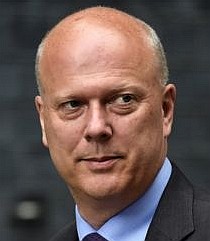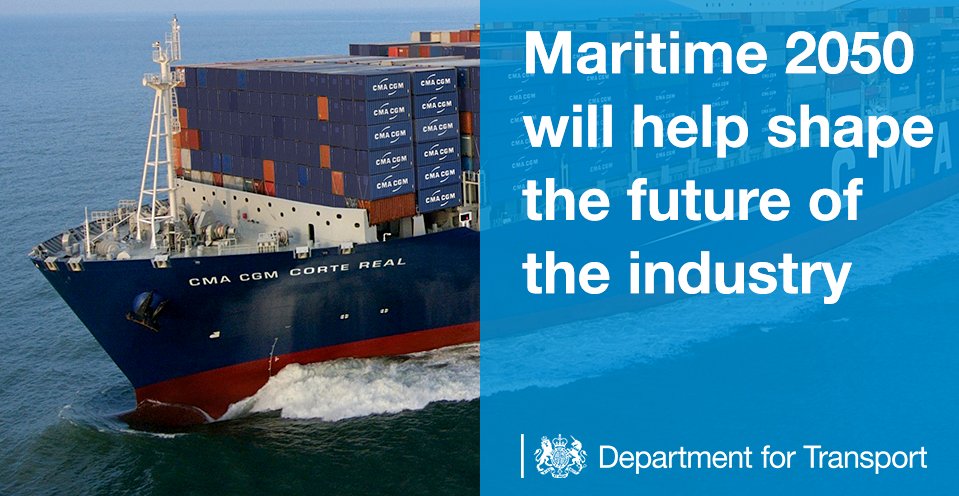

Chris
Grayling and Nus Ghani
<<<<
SECTION 5 INNOVATION
SECTION 6 - REGULATION
Rationale
130. The Maritime 2050 Strategy made the following commitment:
● Government will consider options to
promote the UK flag as the flag of first choice for vessels adopting low or zero
emission technologies.
131. Currently all new vessels are subject to international safety regulations. All ships
using low-flashpoint fuels91 must conform to the International Code of Safety for Ships
Using Gases or Other Low-Flashpoint Fuels (IGF Code)92. This code contains mandatory
safety provisions for the arrangement, installation, control and monitoring of
machinery, equipment and systems using low-flashpoint fuels. The current IGF Code
contains detailed requirements for natural gas as a fuel, while other low-flashpoint
fuels, including hydrogen, can be approved based on alternative design arrangements.
132. Following the ‘alternative design’ process of the current IGF code requires each ship
design to go through an individual process, which must be approved by the vessel’s
flag state for operation, adding time, cost and risk to certification.
133. As one of the leading global flag nations, there is a clear opportunity for the UK
ship register to attract innovators in clean technology for shipping if membership of
the flag gave access to regulatory support to assist the vessel operator through the
alternative design process.
Background
134. A sub-group of the Clean Maritime Council focused on Standards and Regulations
examined the role of government regulations in encouraging the development
and deployment of zero emission vessels. The group concluded that a significant
regulatory barrier is the time required and the complexity involved in working through
the alternative design process. As such this section is focused on regulatory barriers as
they relate to safety and ship standards. There are a number of other regulations
which have a bearing on the uptake of zero emission shipping, including, for instance,
regulations relating to energy networks and planning permission. Considerations
relating to these issues are discussed in the infrastructure section of this document.
135. While future amendments to the IGF Code may be necessary, until more is known
about the use of alternative fuels, it would be impractical to create prescriptive safety
regulations for these fuels. There is also a danger that a prescriptive code may inhibit
innovation if implemented before a fuel or technology is available commercially. The
UK would support future amendments to the IGF Code once fuels are sufficiently
matured. Government will also work to ensure that the UK plays a role in global
standard development for electrification.
136. Government is committed to supporting innovators in the field of clean maritime
technology. In order to mitigate this potential regulatory barrier, Government will establish
he Maritime Emissions Regulation Advisory Service (MERAS) by 2020. Supported by
the Maritime and Coastguard Agency, MERAS will be able to provide dedicated support to
innovators using zero emission propulsion technologies, assisting them through the
‘alternative design’ certification process. This will reduce the time, cost and risk associated
with certifying vessels using zero emission propulsion technologies.
137. In ‘Technology and Innovation in UK Maritime: the Case of Autonomy’93,
published in January 2019 alongside Maritime 2050, Government committed to launching a Maritime Autonomy
Regulation lab (MARLab)94. MARLab supports maritime innovation in the UK,
helping to create an environment which attracts international companies to invest
and test autonomous technologies here. The work of MARLab will then be used to
develop a domestic regulatory framework for maritime autonomy, allowing the UK to
lead negotiations at the IMO to establish international regulations for maritime
autonomy. Although regulatory needs for zero emissions technology differ from the
requirements for maritime autonomy, there are clear synergies between the work
MARLab has already begun, and the future role of MERAS. It is vital to ensure that
the two bodies learn from each other, and support industry in tandem.
138. MERAS has the potential to be beneficial for the UK economy, helping to make the
UK a destination choice for developers and testers of zero emission fuels and
technologies. The support and expertise of MERAS may prove attractive to UK flagged
ships, encouraging them to transition to zero emission shipping and with this unique
offering, increasing the number of ship owners who choose to register their vessels
under the UK flag.
SECTION 7 - NEXT STEPS >>>>
SECTION 1 - TACKLING EMISSIONS
: 14
- 50
SECTION 2 - OUR APPROACH:
51 - 58
SECTION 3 -
ECONOMICS: 59 - 95
SECTION 4 -
INFRASTRUCTURE: 96 - 120
SECTION 5
INNOVATION: 121 - 129
SECTION 6 -
REGULATION: 130 - 138
SECTION 7 - NEXT STEPS: 139 - 140
MAP - THE 2050 PLAN RECOMMENDATIONS
GLOSSARY
END
NOTES REFERENCE LINKS

Grant
Shapps - Secretary of State for Transport 2021
The
Knowledge Transfer Network is Innovate UK’s network partner, and also provides innovation networking for other funders in line with its mission to drive UK growth.
The Department for Transport
works with
Innovate
UK, part of UK Research and Innovation Clean Maritime Plan and supports the transition to Net Zero by
2050 in line with the International
Maritime Organization's (IMO's)
targets for zero emission shipping.

LINKS
& REFERENCE
https://
Please use our
A-Z INDEX to
navigate this site



